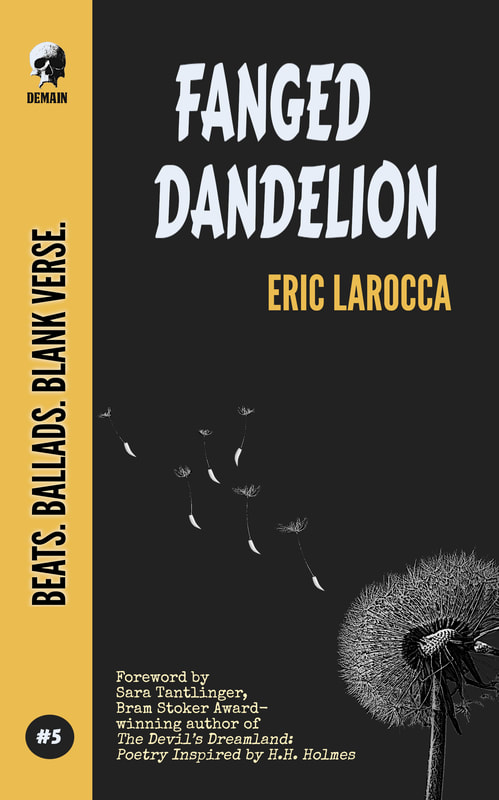|
|
|
We welcome Eric LaRocca to DEMAIN and the Beats! Ballads! Blank Verse! series of books with his Fanged Dandelion. His collection is published on the 31st December but is available now for pre-sales. The cover is by Adrian Baldwin and we are also lucky to have a foreword written by Sara Tantlinger - Bram Stoker Award-winning author of The Devil’s Dreamland: Poetry Inspired by H.H. Holmes. Dean and Eric recently sat down and talked.
DEMAIN PUBLISHING: Eric! Great to meet you, welcome to DEMAIN. ERIC LaROCCA: A pleasure. DP: So let’s get down to it – can you tell us a little about your background. ELR: Sure, I suppose I come from a literary background in the sense that both of my parents emphasized the importance of reading to me from a very early age. They, themselves, are avid readers and are lovers of literature. My mom, especially. She would often take me to the local library and let me pick out which books I’d like to read for the week. It was there I really developed an interest in writing and creating different worlds to which I could escape. My mom remains my biggest advocate to this day and she usually reads all of my material before it’s eventually published. DP: That’s very cool – so before your mother reads them, how do your poems develop? Do you have a particular writing method? ELR: The writing process for Fanged Dandelion was very spontaneous and consequently very organic. I wanted to write about my fragile mental state while in lockdown during the Covid-19 pandemic, but I wasn’t sure how to broach the subject. Moreover, I wanted to candidly write about something I suffer from – intrusive thoughts. (For those who aren’t familiar with intrusive thoughts, they’re typically unwelcome or unpleasant thoughts that may eventually take form as an obsession.) I wanted to be as vulnerable as possible writing this project and my partner suggested I attempt to write poetry. Because he was so instrumental in the genesis of this idea, I fed him drafts of my poems daily – sending him sometimes three or four poems at a time. I used to not show others my works in progress out of fear of superstition. However, I find myself welcoming the idea of feedback throughout the writing process and I’m eager to share my work even in its infant stages. DP: The pandemic has been tough for a lot of people and it seems you’ve had it tougher than a lot – it’s great that you’ve been able to create and make something positive from the nightmare we’ve suffered during 2020. Could you tell us how you start a poem – is it different to beginning a short story (as an example)? ELR: I’m a very visual writer, so I typically begin a poem with an image or a concept I’d like to explore. From there, I build the skeleton of the poem. Then, once I’ve established some key visual elements I’d like to incorporate, I flesh out the poem from there. It’s a very impulsive process and far less structured than my arrangement when writing fiction. It was so refreshing to write, in fact. When writing fiction, I’m usually chained to an outline – shackled to structure – but, with poetry, I feel a much more profound sense of freedom to take risks and to write from wounded places. DP: That’d be a great title: “Writing from Wounded Places” – might have to borrow that…would you say writing poetry energises or exhausts you? ELR: It’s very interesting you ask that, because I found myself completely exhausted while working on this poetry collection. At the time, I wondered if it was merely fatigue from being cooped up inside all the time. But, at I look back on the period of my life when I was writing these poems, I can’t help but wonder if it was because being so vulnerable and so exposed took a toll on me. I think poetry is such a rewarding art form and I encourage all writers to try their hand at it at some point in their writing life. However, poetry can be soul-sucking sometimes. It can exhaust you completely. DP: I get that, in my younger days I did write a lot of poetry and I’d often go into a ‘fugue state’ whilst writing and when I was finished I was bleedin’ shattered – after a few collections, I retired as it was seriously fatiguing me. Problem is, I’ve been thinking about starting writing again…anyway…would you say poetry has a purpose? ELR: I think poetry affords the writer the opportunity to expose their demons – to exorcise and revitalize. I think poetry serves a purpose for the reader as well as the writer. Poetry shows us that we’re not alone – that our fears, our insecurities, our uncertainties are understood by others and that we are not alone. DP: I get that and that’s why I love Arthur Rimbaud so much – I’ve really connected his work (in both English and French properly now) and words and I’ve often got a copy of his poems in the near vicinity (in fact I can see one collection just on the table to my right ha ha). How did you first get published as a poet by the way? ELR: Believe it or not, my experience at DEMAIN has been my first experience as a published poet. Although I had a few poems published in various high school-level literary online zines, my collection with DEMAIN will mark my debut as a poet. I’m so grateful to you Dean for this opportunity as it means so much to me. I can certainly tell you this will absolutely not be my last poetry collection. After the transformative experience I had writing Fanged Dandelion, I can assure you that poetry will most certainly remain in my future. DP: That’s brilliant – we really enjoyed the collection and it deserves to do well. Who are your favourite poets and are you reading anyone at the moment? ELR: Tennessee Williams will always hold a special place in my heart as one of my favorite playwrights/poets. Although audiences/readers are far more acquainted with his works for the theatre, many might be surprised to know he wrote a series of published poems. His work is always tender and deeply wounding. As far as modern poets go, I’m very impressed by the work of Stephanie M. Wytovich. Her writing is splendid and profoundly aching. I’m, of course, a huge admirer of Sara Tantlinger – the Bram Stoker award nominated author of the introduction for Fanged Dandelion. I’m also such a dedicated fan of Cynthia “Cina” Pelayo. Her writing is always world class and I’m especially eager to begin reading her latest offering, Into the Forest and All the Way Through. DP: Ah, Tennessee! There was a bar in Cannes where I used to drink a lot as it was quiet, tucked away from the main drag and was small, personal – anyway, apparently he used to drink there all the time when he was visiting – not sure if it’s true actually but it was a nice story the owner always used to tell me. It’s become an ice-cream parlour now which is a shame…Eric, any advice you could give an aspiring poet? ELR: I don’t know if I’m qualified to give expert advice as I’m somewhat of a novice to the world of poetry, but if asked to guide an aspiring poet, I think I would simply tell them to be fearless. Write from the scab that never healed. Dip your pen in the wound that never closed. Be as vulnerable as possible and write what upsets you. I would urge them not to be scared simply because what haunts them most likely haunts another reader – this is an opportunity to connect with another person and have them understand you in a very unique way. Poetry is a glimpse into humanity. I would urge them to take pride in that fact and write from the heart. Thank you Eric for your time – we really appreciate it. Welcome to DEMAIN and the best of luck with Fanged Dandelion. If you’d like to connect with Eric direct: Website: ericlarocca.com Twitter: @ejlarocca Instagram: @ejlarocca
0 Comments
Leave a Reply. |
CategoriesArchives
November 2023
AuthorDean M. Drinkel |


